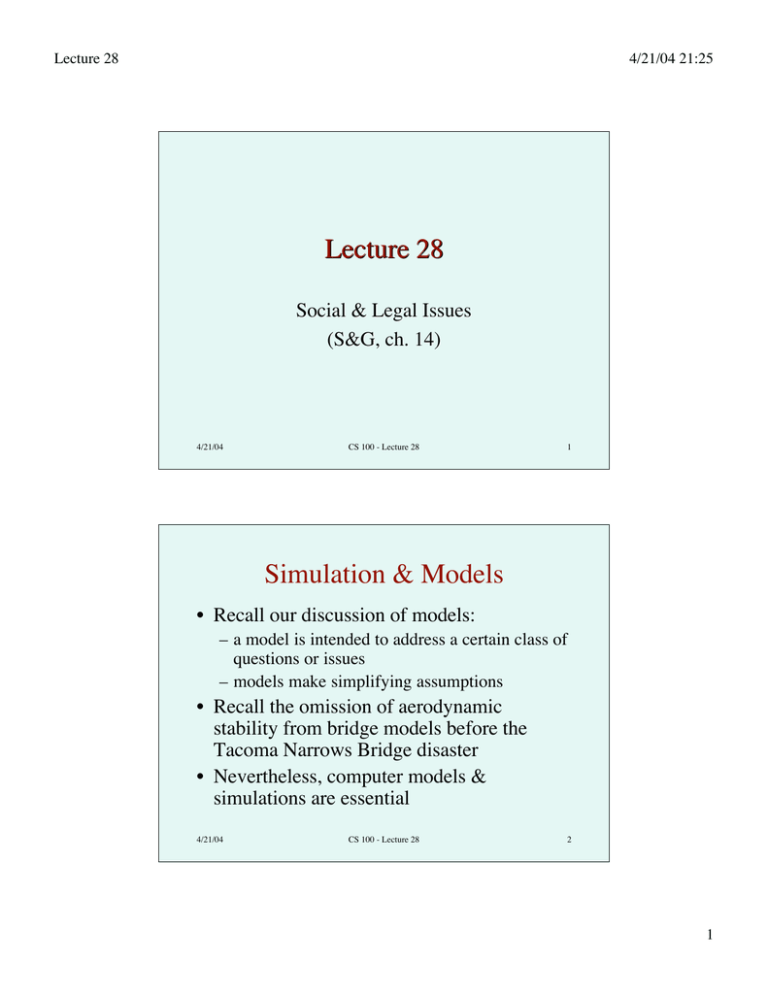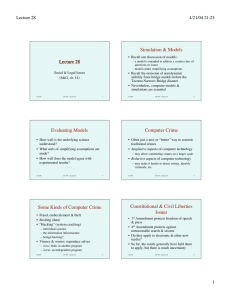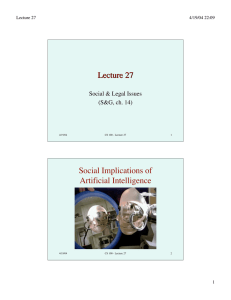Lecture 28 Simulation & Models Social & Legal Issues (S&G, ch. 14)
advertisement

Lecture 28 4/21/04 21:25 Lecture 28 Social & Legal Issues (S&G, ch. 14) 4/21/04 CS 100 - Lecture 28 1 Simulation & Models • Recall our discussion of models: – a model is intended to address a certain class of questions or issues – models make simplifying assumptions • Recall the omission of aerodynamic stability from bridge models before the Tacoma Narrows Bridge disaster • Nevertheless, computer models & simulations are essential 4/21/04 CS 100 - Lecture 28 2 1 Lecture 28 4/21/04 21:25 Evaluating Models • How well is the underlying science understood? • What sorts of simplifying assumptions are made? • How well does the model agree with experimental results? 4/21/04 CS 100 - Lecture 28 3 Computer Crime • Often just a new or “better” way to commit traditional crimes • Ampliative aspects of computer technology – may allow committing crimes on a larger scale • Reductive aspects of computer technology – may make it harder to detect crimes, identify criminals, etc. 4/21/04 CS 100 - Lecture 28 4 2 Lecture 28 4/21/04 21:25 Some Kinds of Computer Crime • Fraud, embezzlement & theft • Stealing (data) • “Hacking” (system cracking) – individual systems – the information infrastructure – benign hacking? • Viruses & worms: reproduce selves – virus: hides in another program – worm: an independent program 4/21/04 CS 100 - Lecture 28 5 Constitutional & Civil Liberties Issues • 1st Amendment protects freedom of speech & press • 4th Amendment protects against unreasonable search & seizure • Do they apply to electronic & other new media? • So far, the courts generally have held them to apply, but there is much uncertainty 4/21/04 CS 100 - Lecture 28 6 3 Lecture 28 4/21/04 21:25 Communication Media • Is the operator of a communication medium responsible for the information it carries? – analogy: telephone companies & post office – analogy: a privately-owned meeting room • Can the operator restrict this information? – analogy: telephone companies & post office – analogy: private presses 4/21/04 CS 100 - Lecture 28 7 Encryption & Wiretapping • Encryption can be used to ensure privacy & authenticity – may be used for legal/illegal purposes • May be subject to export restrictions • What provisions should be made for government interception & recording of communications? • What limits should be imposed on the government 4/21/04 CS 100 - Lecture 28 8 4 Lecture 28 4/21/04 21:25 These questions are especially relevant to issues such as the “USA PATRIOT” Act 4/21/04 CS 100 - Lecture 28 9 How do we address these issues? • Engineering issues (efficiency, economy, elegance) – addressed by engineering analysis & other kinds of technical expertise • Legal issues – addressed by lawyers, courts, etc. • Ethical issues – addressed by ethicists & ethical analysis 4/21/04 CS 100 - Lecture 28 10 5 Lecture 28 4/21/04 21:25 New Ethical Issues • Consider a relatively well-defined ethical problem: • Is it ethical to “hack” into someone else’s computer system (and do no damage)? • Traditional moral codes do not address this issue! • So we must apply ethical analysis 4/21/04 CS 100 - Lecture 28 11 Ethical Analysis • Only touching on a few basic ideas • Ethics = “the study of how to decide if something is morally right or wrong” • What criteria are used for judging the rightness or wrongness of an action? • There are several well-established approaches to defining criteria 4/21/04 CS 100 - Lecture 28 12 6 Lecture 28 4/21/04 21:25 Consequentialism • If the consequences of an act are on the whole good, then the act is good • If the consequences of an act are on the whole bad, then the act is bad • Good or bad for whom? • Utilitarian criterion: the greatest total happiness • Also, may be difficult to predict consequences 4/21/04 CS 100 - Lecture 28 13 Deontological Criterion • Deontology = the study of moral obligation • Rather than focusing on the consequences of an act, deontological arguments focus on the inherent nature of the act • Two important questions: – What is the intent of the act? – Is it a defensible, responsible act? 4/21/04 CS 100 - Lecture 28 14 7 Lecture 28 4/21/04 21:25 Two Important Tools of Ethical Analysis • Dialectic • Analogy 4/21/04 CS 100 - Lecture 28 15 Dialectical Method • Root meaning of dialectic is conversation • Philosophical dialectic: a method of approaching the truth by moving critically among two or more viewpoints • The strengths & weaknesses of each viewpoint are revealed, especially from the perspective of the others • Ideal outcome: a synthesis that combines the strengths & eliminate the weaknesses • More commonly, leads to better understanding of improved viewpoints 4/21/04 CS 100 - Lecture 28 16 8 Lecture 28 4/21/04 21:25 Analogical Method 1. Identify analogous situations that are more familiar or better understood 2. Identify similarities & differences between the analogy and the issue of concern 3. Consider their relevance to the issue 4. Explore competing analogies dialectically 4/21/04 CS 100 - Lecture 28 17 A Method of Ethical Analysis 1. Identify stakeholders 2. Identify what is at stake (utilitarian step) 3. Identify duties & responsibilities (deontological step) 4. Think of analogies 5. Make a decision or repeat the steps 4/21/04 CS 100 - Lecture 28 18 9 Lecture 28 4/21/04 21:25 Three Case Studies • Sharing music files • Zimmerman & PGP encryption • “Hacking” computer systems 4/21/04 CS 100 - Lecture 28 19 Reminder: Final Exam Monday, May 3 2:45 – 4:45 4/21/04 CS 100 - Lecture 28 20 10 Lecture 28 4/21/04 21:25 Next Time: a movie on the history of computing & a short quiz (to ensure you pay attention!) 4/21/04 CS 100 - Lecture 28 21 11



